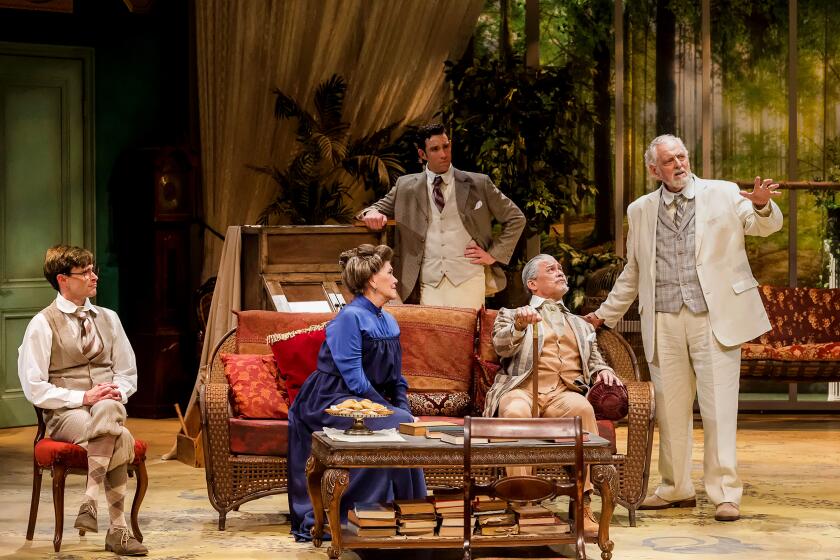FRINGE FESTIVAL : DU PLENTY’S GOT PLENTY OF SOMETHIN’
Tomata du Plenty enjoyed notoriety in Los Angeles as lead singer for the punk rock band Screamers in the ‘70s and as a visual artist in the ‘80s. Now, at 39, he’s first taking up dance. Sound overly ambitious?
“Nah,” he drawls, mock- plie- ing to jazz music at a friend’s downtown loft. “It’s why I chose that name: Do plenty. Which means you don’t have to be some expert to make work that matters. It’s more democratic than that virtuosity number where doing one thing well means you can’t do a lot of others.”
A wariness of what Tomata calls “glamming onto just one gift” accounts for his desire to “make good on a love of dancing,” regardless of his lack of training or expertise as a mover.
But is it art? “Hey look, I have great respect for knock-’em-dead, solid-gold ballet and modern dancers,” he says, referring to his 21-year-old collaborator, Fred Barr, during a rehearsal of their dance-based performance art piece, “Last Stop L.A.,” to be presented by Los Angeles Contemporary Exhibitions (LACE) today as part of the Fringe Festival.
“This piece is nothing without his discipline and direction,” he adds, “even though we can drive each other up the wall.”
In creating “Last Stop L.A.,” Tomata took up Barr’s suggestion and used the autobiographical trappings of performance art he’d always scoffed at to “tap into the cathartic tensions about an old scatterbrain who’s tried out about 40 careers” and a “young upstart with similar ambitions but following in different footsteps.”
“I have this philosophy about gumption,” Tomata says, “about getting yourself off your duff and becoming part of somebody’s adventure all the time, even if it means lightening up on your own, even if it means giving up what you’ve learned. I think that could save the planet. Listen to me, I got some nerve preaching.”
Barr snickers at Tomata’s attempt at humility. “Tomata is very pretentious about not coming off as pretentious,” he confides.
Maybe so. Even Tomata has to admit that his repudiation of aloofness in art-making has at times helped to cover up his failures and what he calls “explosive emotional stuff about who I am.”
“I’m more the perfectionist,” Barr quips, even as Tomata cheerfully reminds him of the movements he just set and had apparently already forgotten.
Dressed in tank T-shirt and dungarees rolled up to his knees, Tomata performs Barr’s part-balletic, part-boxing choreography with an easygoing manner. “You’re wrong if you think I look more sure of myself than this guy,” he warns. “People are going to come to LACE and ask, ‘What is Tomata doing on stage trying to do a double turn, making a fool of himself.’ ”
But Tomata feels that the joke’s on them. “I mean, everyone is so paralyzed by ideas that they’re not good enough. I get only more frightened as I get older. But these doubts seem reason enough to keep plugging away without always worrying about having to awe the crowd each time out.”
The irony is, as Tomata states it, “that if you work well, you can really inspire--not in the same way as the ballerina who’s been at it her whole life, but in a way that can clue a peer into survival.”
A 15-foot canvas on the wall picturing a blue matador and green bull illustrates his point. Tomata confesses that not only did “painting save my life” in spiritual matters, it also helped bail him out in financial ones, as art buyers apparently appreciated his work.
Still, even with this new dancing career, Tomata sees no reason why the painting has to stop--even if an opening of his work at the Bad Eye art gallery in Hollywood is coincidentally scheduled the same night as his performance. “I’m going to be bicycling like a maniac from Bad Eye to LACE tonight,” he says.
Won’t stretching his talents--not to mention venues--tire him out for the dance numbers? Maybe so, but he’s not worried. “The difference between Fred and me is that he’s facing a career, and I’m throwing it away,” he says with a chuckle.
Then Tomata’s own grin breaks off, Chaplin-like, into a frown. “I see a lot of value in fragmentation,” he says. “And anyway, who’s above admitting to mistakes? Not me. So what’s the big deal. You take a few breaths and you try again.”
More to Read
The biggest entertainment stories
Get our big stories about Hollywood, film, television, music, arts, culture and more right in your inbox as soon as they publish.
You may occasionally receive promotional content from the Los Angeles Times.






